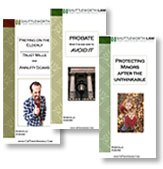Trust Review – When and Why Your Trust Should be Reviewed
Clients are commonly concerned that the revocable trust they created is no longer valid. Fortunately, the passage of time rarely affects the validity of a trust. However, the following issues should trigger you to review, and possibly update, your trust:
You Have an A/B Trust (Couple’s Trust Only): Back in the 1990s and the early 2000s, estate-planning attorneys drafted what are commonly referred to as an “A/B” type trust. These types of trusts were designed to maximize the amount a couple could pass free of estate tax, especially when the estate tax exemption was low. For example, in 1997, the estate tax exemption was $600,000. This means that if a person died in 1997 every dime of the decedent’s net estate over $600,000 was taxed at about 50% unless they had a properly drafted and administered A/B trust. If so, a couple could pass $600,000 x 2 (1.2 million) without estate tax.
However, A/B trusts have some real drawbacks.
First, portions of the trust are irrevocable upon the first spouse’s death. This means the survivor may not be able to make any amendments to a portion of the trust assets.
Second, after the first spouse’s passing it is likely that a separate tax return for part of the trust will be required. This means more record keeping and costs for tax preparation.
Third, there are restrictions on what the surviving spouse can do with some of the assets in the trust. Often times these restrictions are not overly burdensome, but nonetheless the surviving spouse does not have unlimited access to do what he or she wants with a large part of the trust assets.
Fourth, typically you must keep excellent records knowing you may be required, by a court or otherwise, to explain to a trust beneficiary what you have done with some of the assets. This means that you may have to explain to your children, step-children, grandchildren, etc, how you are spending your money and why.
Now that the estate tax exemption amount has risen dramatically ($5,000,000 in 2012), few clients will realize any benefit from an “A/B” type trust because their estate is unlikely to be valued more than the estate tax exemption amount. In this case, you get primarily all the downsides of the “A/B” type trust and few, if any, of the benefits.
So, how do you know if you have an “A/B” type trust? Well, the only sure way is to have a qualified attorney review your trust, but here are two things that would suggest you do have one of these types of trust:
1) Your trust says that some trusts are irrevocable after the passing of one spouse; and,
2) Your trust says that after the death of a spouse the trust assets are to be divided between an A and B share, a A, B or C share, a survivor’s trust, a bypass trust, a marital trust or a QTIP trust.
If you have an “A/B” type trust and a relatively modest estate, ask a qualified attorney about the benefits of other types of trust, including a “Disclaimer” trust, in order to avoid the negative aspects of the “A/B” trust.
Life Changes – Marriage, Divorce, Birth and Death. If after your signed your trust you have married, divorced, had a new child or a close family member has died, then it would be a very good idea to have your trust (or will for that matter) reviewed because these types of life changes, without proper planning, could change your trust in ways you did not intend.
The Nominated Successor Trustees Need to be Changed: Perhaps the person you identified years ago to administer the trust when you die has fallen out of favor or died themselves. If so, you will need to make changes to your trust in order to avoid having someone act on your behalf whom you would not approve if given the choice.
Change Beneficiaries: If you now want to change the beneficiaries, you should have your trust reviewed and updated as necessary to carry out your wishes.
There are other circumstances that should trigger you to have your trust reviewed or updated. This list is not exhaustive, but does identify the top reasons typically requiring a trust review.

